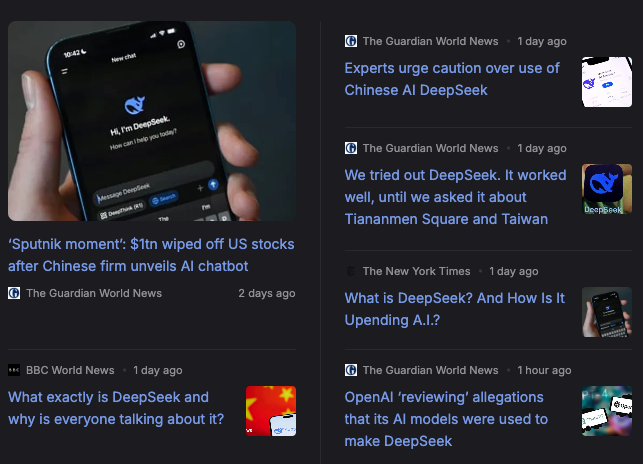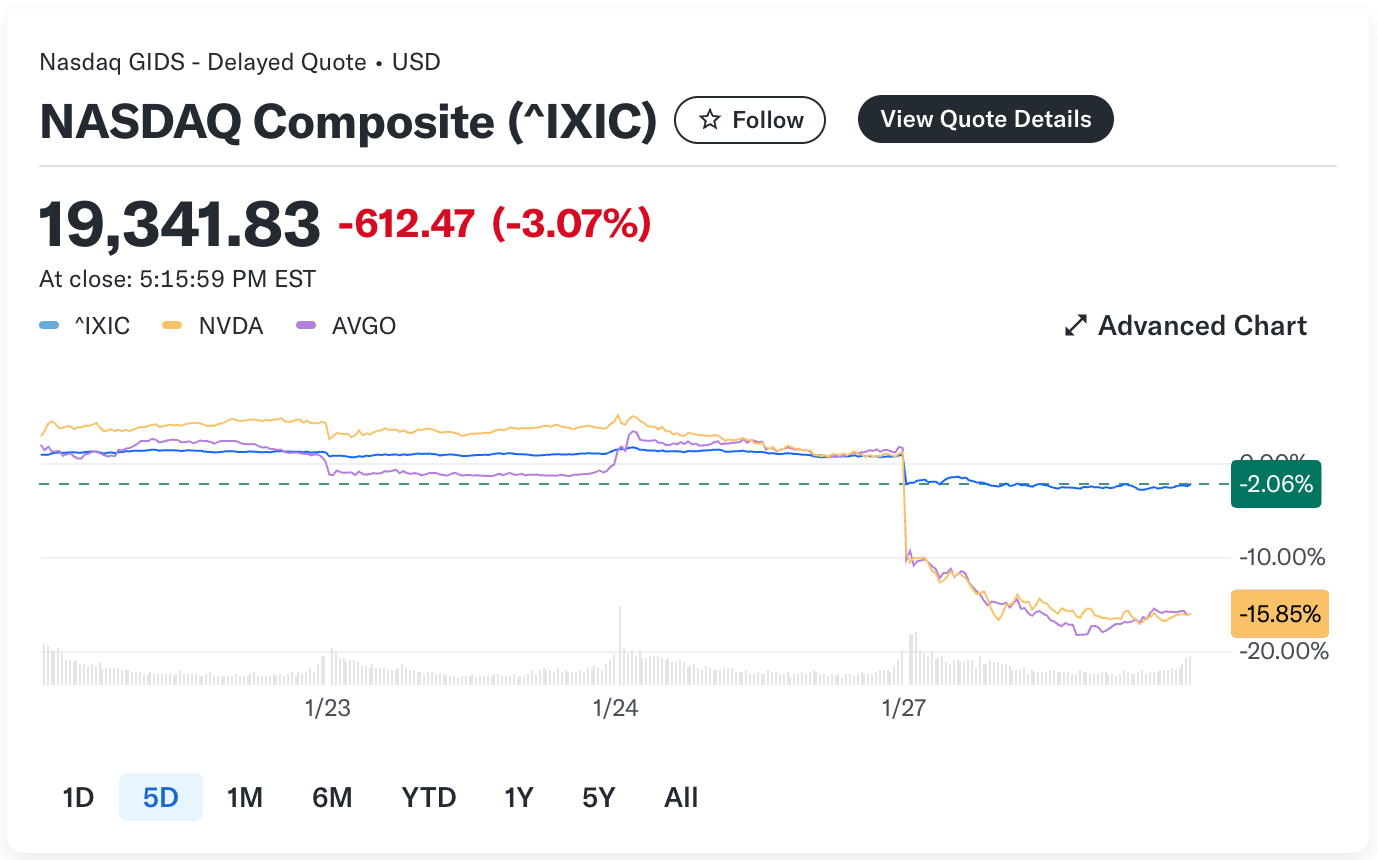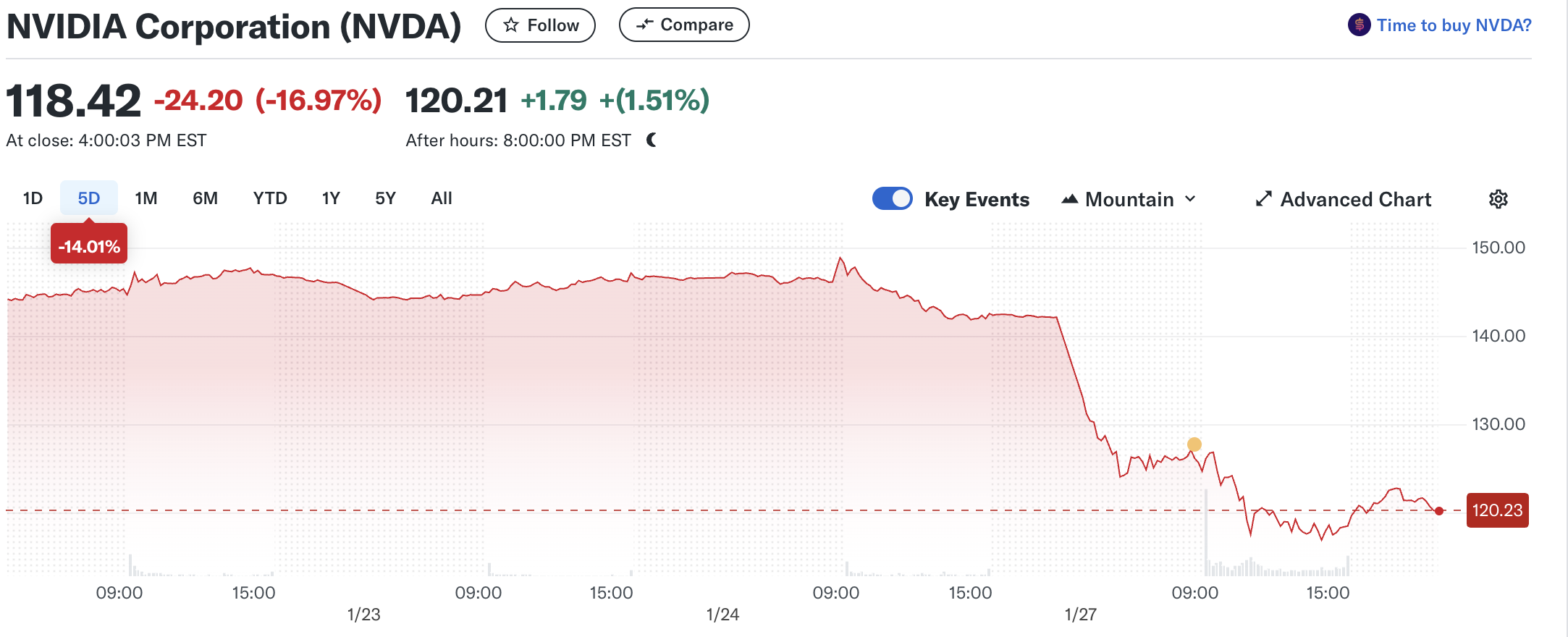2 AI headlines explained

👋 Welcome to New Vintage, a weekly taste of tech for wine professionals to level up with no-code and AI tools.
"THE RACE IS AFOOT" was my favorite LinkedIn comment from all the posts about DeepSeek the past few days.
It may not say much, but it captures the vibe amongst AI enthusiasts and vigilant investors alike: US dominance in AI has been publicly challenged.
Headline #1: a small Chinese AI startup just matched OpenAI's best performing model

So much so that the NASDAQ looked like this Monday:

NVIDIA did this:

A recap of context so this story makes more sense
- OpenAI has largely been "winning" the AI race, with notable advancements in model performance for 4o (multimodal) and o1 (reasoning)
- o1 has been arguably the "smartest" model available, especially excelling in coding, math, and science problems
- Despite their name, OpenAI is not open (meaning open-source), as it was originally intended
- OpenAI has maintained a consistent advantage over open source projects (there are benchmarks for model performance)
- The best commercially available models have largely come from OpenAI, Anthropic, and Meta
- DeepSeek (a relative unknown) released models on January 20th, notably r1 which:
- is seemingly "as smart" as o1
- is 20-50x cheaper to use
- cost (supposedly) less than a tenth of the cost of o1 to train (AI lingo for build/make)
- used older, cheaper hardware instead of the fancy stuff US companies have been using (hence the giant hit to NVIDIA)
- is open source
- now is the top free app in the Apple app store (above ChatGPT)
- and...DeepSeek is a Chinese company
So, the race is afoot.
Why the DeepSeek r1 story matters for wine people
If you've been keeping up, or if you read "A primer on AI for busy wine people" (shameless plug), you're well aware that companies around the world have been spending an unprecedented amount of money training AI models and trying to build products with them.
Largely, the best models have been produced by those with the most capital (OpenAI, Anthropic, xAI, and Meta). These companies are also in the US. Some other companies like Stability AI (UK) and Mistral (France) have been relevant, but not leading the pack commercially. The latter two are mostly open source, but their models have been largely trailing the bigger, closed source companies in performance.
DeepSeek's r1 model is not only open source, vastly more efficient, cheaper in every way, but it also rivals OpenAI's o1 in every major benchmark.
This is not a rush to any sort of conclusion, it's one data point in an extremely fluid landscape, but it's one of the most significant displays of a team doing "more with less" to date.
Time will tell where this all nets out, but one theory is that the core foundation models (think general purpose, really big ones that power ChatGPT-like experiences) will only continue to converge in capability, effectively "commoditizing" general intelligence. As that happens, the relative cost to adapt these models into specialized versions (think narrow purpose) will go down and productivity advantages will go to those who get this right.
Regardless of how much you want to engage with this wave, it's happening.
One place to start would be to categorize tasks/workflows into two buckets:
- general purpose: this work can be done by a person on a computer with minimal training/special purpose knowledge
- narrow purpose: this work requires specific knowledge (about your business, about agriculture, about winemaking, about individual customers, etc.) to be completed effectively
Look to general purpose tools now to "do more with less" and start figuring out which narrow purpose tasks are worth investing cycles in to figure out.
Headline #2: OpenAI released 'Operator'
Speaking of general purpose tools and OpenAI's product dominance, they recently released a research preview of a web-browsing agent called Operator (announcement, product link).
Note: at the time of reading this, the product may not be available to all ChatGPT users
Operator is like being able to talk to your internet browser and watch it take actions for you. It's early days on this, but consider this a glimpse into the future. Here is one of their official demos:
Now, I hear a lot of leaders in the wine industry talk about how to sell more wine to the younger generations.
There's a lot here and we're not going to solve it in a newsletter, but I pose a question: what does selling wine online, to anyone, look like in an age of ubiquitous AI?
If I can ask future versions of Operator to shop for wine for me, how will you optimize my shopping experience? Does brand become even more important (so that I ask directly for you)? Do you build a version of your website for AI agents?
Operator itself is super early, and the capability of having a system control an internet browser isn't new, but the evolution towards AI dynamically using it based on basic instructions is an incredible innovation.
It's worth lingering on these thoughts and pulling on these threads. The technology is advancing, with or without us, and consumers all over the world will be inundated with these capabilities.
This is not an alarm, this is an opportunity to lean in.
“If you want power to be used for good, more good people need to have power.” - Jeffrey Pfeffer
Hope this helps,
Stephen

Comments ()